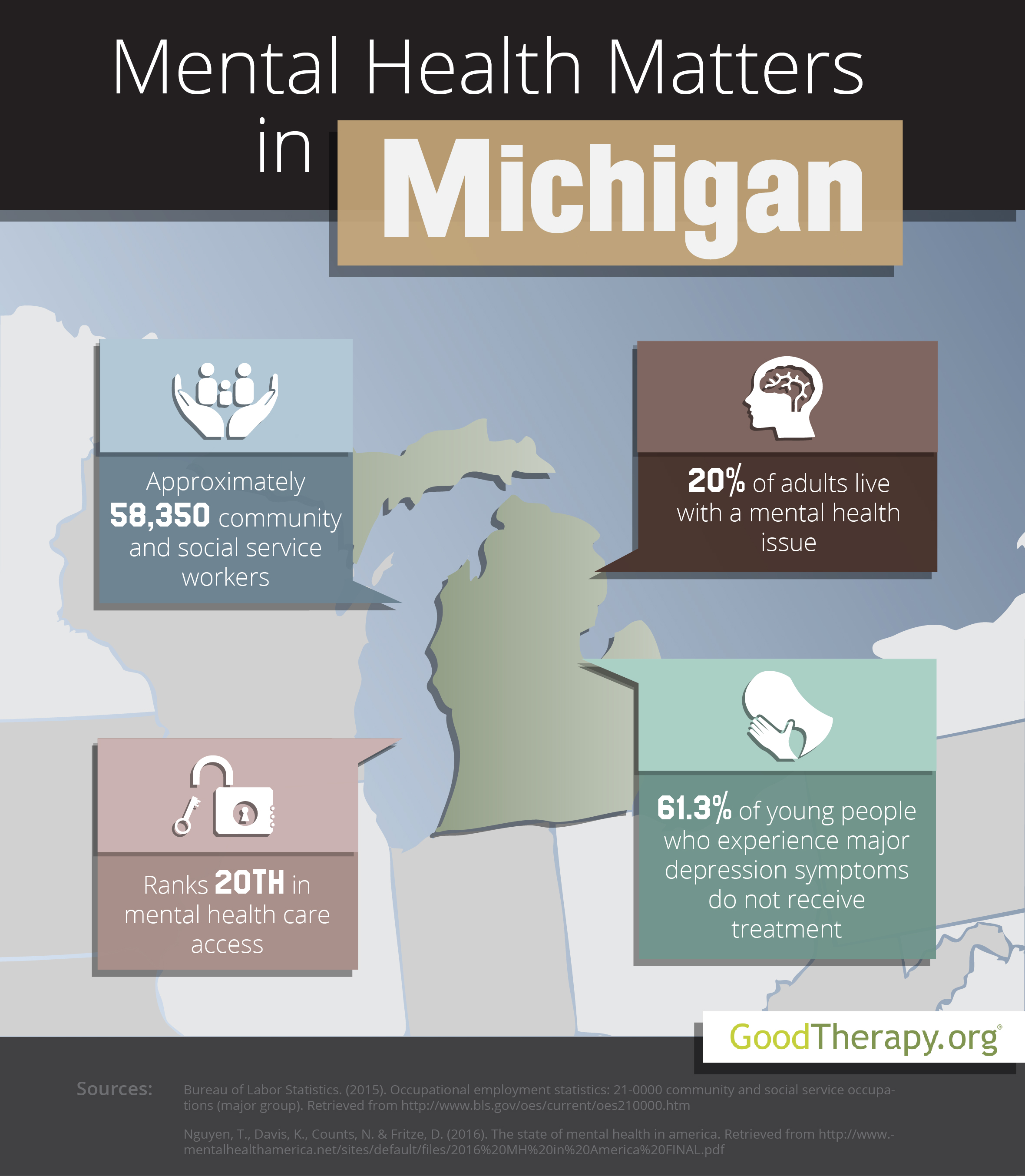Find a Therapist in Michigan
Welcome to the Michigan therapist directory at GoodTherapy.org. Our directory is the fastest and safest way to find a good counselor or therapist in Michigan cities. We only include professional therapists, counselors, and psychologists whose work accords, in attitude and orientation, to the elements of good therapy. Find a therapist or counselor in your Michigan zip code, or click on the links below to see the counselors in your city. If you are looking for telehealth therapy you can click here to see all Michigan telehealth therapists.
Genesee County
Grand Traverse County
Gratiot County
Houghton County
Ingham County
Ionia County
Kalamazoo County
Kent County
Lenawee County
Livingston County
Macomb County
Monroe County
Oakland County
- Birmingham
- Bloomfield Hills
- Commerce Township
- Farmington Hills
- Ferndale
- Highland
- Huntington Woods
- Milford
- Novi
- Rochester
- Rochester Hills
- Royal Oak
- Southfield
- Troy
- Walled Lake
- West Bloomfield
Shiawassee County
Washtenaw County
Wayne County
Mental Health Matters in Michigan
Estimates from the United States Census Bureau indicate Michigan had a population of about 9.9 million people in 2015. Approximately 50.9% of all residents were female. Minors accounted for 22.4% of the population, while 15.4% were age 65 or older. In 2015, roughly 648,273 veterans lived in Michigan. According to reports from the Bureau of Labor Statistics (BLS), 58,350 residents were employed in jobs that specialized in community and social service activities. These jobs included working at residential treatment centers, outpatient care centers, hospitals, correctional facilities, rehabilitation centers, clinics, community centers, depression treatment centers, schools, and religious institutions. According to the BLS, people in these fields earned an annual average salary of $45,290.
 Mental Health in Michigan
Mental Health in Michigan
In 2016, Mental Health America (MHA) ranked Michigan overall rank at 32nd—when compared to other U.S. states and the District of Columbia—for its mid-range mental health standards, practices, and resources. Michigan was 39th in adult ranking, 25th in youth ranking, 42nd in the rate of experienced adverse mental health conditions, and 20th in access to mental and behavioral health services.
According to the 2016 MHA survey, roughly 20% of the adult population in Michigan experiences mental health issues. It ranked a low 42nd in this measure. Additionally, 9.1% of adults have concerns with alcohol or drug dependence, and 4.5% of adults have seriously thought about suicide. The state was 31st and 47th in these categories. Approximately 16.8% of people who live in Michigan and who have mental health issues are uninsured.
Therapists in Michigan have also identified issues that may affect the younger population. Data from the Substance Abuse and Mental Health Services Administration (SAMHSA) indicates in 2012-2013, Michigan’s percentages of illicit drug use among teenagers, cigarette use among teenagers, and binge alcohol use among those aged 12-20 were all above the national average, which is 14.7%. The 2016 MHA survey gave Michigan a mid-range rank of 28th for youth dependence on drugs or alcohol.
Therapy has proven to be very effective for adults, teenagers, and young children with mental, emotional, and behavioral issues. There are a variety of mental health care providers—including counselors, psychiatrists, marriage and family therapists, licensed clinical social workers, mental health nurses and child psychologists—in Michigan who are able to provide professional assistance. Individuals with adverse issues are encouraged to find a therapist and receive the care they need in order to live a healthier and happier life.
References:
-
Bureau of Labor Statistics. (2015). Occupational employment statistics: 21-0000 community and social service occupations (major group). Retrieved from http://www.bls.gov/oes/current/oes210000.htm
-
Nguyen, T., Davis, K., Counts, N. & Fritze, D. (2016). The state of mental health in America. Retrieved from http://www.mentalhealthamerica.net/sites/default/files/2016%20MH%20in%20America%20FINAL.pdf
-
Substance Abuse and Mental Health Services Administration. (2014). Behavioral health barometer: Michigan, 2014. Retrieved from http://www.samhsa.gov/data/sites/default/files/State_BHBarometers_2014_1/BHBarometer-MI.pdf
-
United States Census Bureau. (2015). Quick facts: Michigan. Retrieved from https://www.census.gov/quickfacts/table/PST045215/26
Advanced Search | Browse Locations | International Search